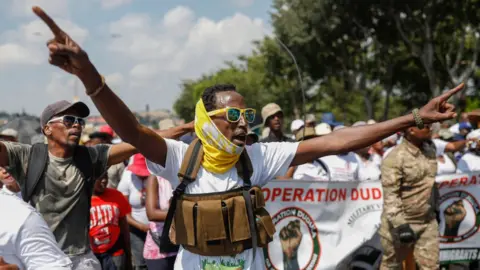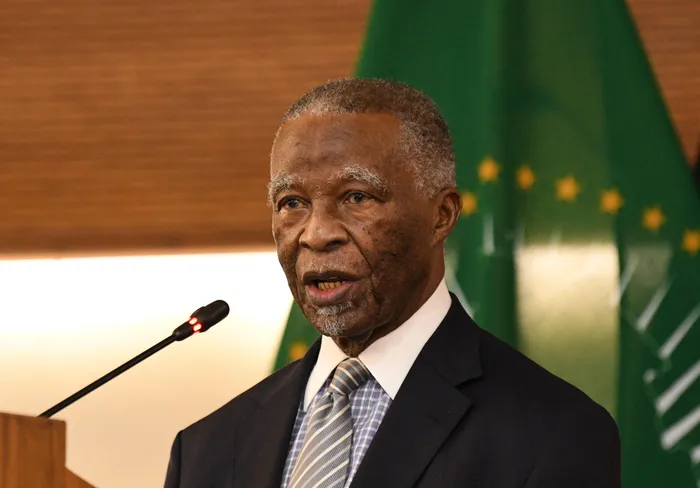What is Operation Dudula? South Africa’s anti-migrant movement chasing away Nigerians, other foreigners out of hospitals

Operation Dudula: Why Migrants Are Being Denied Healthcare in South Africa. Photo credit: Getty image
Operation Dudula began as a township-based, anti-migrant vigilante movement in Soweto and later formalised parts of its activity into political organising. The name “Dudula” (isiZulu for “force out” or “push out”) signals the group’s core aim: pressuring authorities and communities to eject migrants they see as illegally living or working in South Africa. The organisation has grown beyond Soweto, staged protests at embassies and public institutions, and registered as a political entity in recent years.
Let’s fight against the influx of illegal foreigners in our townships and take back our township economy. pic.twitter.com/FXb3kho9AI
— Operation Dudula (@0perationDudula) September 7, 2025
What they are doing at hospitals — and why it matters
Since mid-2025, members and allied anti-migrant groups have been gathering outside clinics and hospitals in provinces such as Gauteng and KwaZulu-Natal, checking IDs at entrances, demanding to see South African identity documents, and in many documented cases preventing non-South Africans from entering to seek care. Humanitarian groups and medical NGOs warn that these actions are endangering lives, with reports that people have been denied treatment and at least some deaths may be linked to blocked access. These tactics directly conflict with South Africa’s constitutional guarantee of emergency healthcare for everyone.
South Africa’s Operation Dudula, notorious for violently chasing away fellow Africans, finally met their match in this Nigerian man 😂😂 pic.twitter.com/wskvgqqHFG
— sureboy 🪖 (@Asarailu_) September 5, 2025
What Operation Dudula says it wants (their stated demands)
Operation Dudula frames its hospital actions around a few repeating claims and demands: that undocumented migrants are overburdening public health services, that South Africans should receive priority access to strained facilities, and that undocumented migrants engage in criminal activity (including alleged diversion of medication). They demand stricter enforcement of immigration laws, verification of IDs at service points, and in some localities they have pushed for the removal or deportation of undocumented people. Whether these claims are supported by data is contested.
View this post on Instagram
What evidence and data say about migrants’ use of services
Available research and NGO reporting indicates migrants form a small proportion of the population and are not the dominant users of health services that Operation Dudula alleges. Civil society groups point out that the systemic problems in public healthcare — staff shortages, supply chain failures, underfunding and mismanagement — are broader drivers of long queues and stockouts, not simply foreign patients. These facts are often cited by NGOs pushing back against the narrative that migrants are “taking over” clinics.
Legal, ethical and public-health issues
South Africa’s Constitution and the National Health Act guarantee access to emergency medical treatment regardless of immigration status. Blocking access or demanding ID before treating an emergency can violate the law and medical ethics (including the Hippocratic duty). Health authorities and opposition parties have called for police intervention and for health departments to uphold patients’ rights; NGOs (Doctors Without Borders/MSF, HIAS and others) have issued urgent statements condemning the blockades and warning of public-health consequences. Allegations have even surfaced that some healthcare workers collude with protesters — a claim the health department says it will investigate.
Motives beyond health access — politics, economics and social strain
Operation Dudula’s hospital tactics should be read in a broader context: high unemployment, inequality, crime, and frustrated service delivery create fertile ground for xenophobic scapegoating. Politically, anti-migrant sentiment can be mobilised by local leaders and small parties seeking support; Dudula’s transition toward formal politics illustrates that dynamic. Social media amplification and deliberate disinformation campaigns have also magnified fears and sometimes produced false or misleading imagery that fuels mobilization.
My sister arrived at the local clinic & found it empty. @zibuseman @OperationDudula stopped foreigners from getting in. She was helped inside, got her medication without waiting the whole day like she used to. If that's xenophobic, then I'm proudly so. pic.twitter.com/8et3jA9mPU
— Aluwani 🇿🇦 (@AluVera2) September 4, 2025
Consequences on the ground
Blocking clinics risks direct loss of life (delayed emergency care), spreads fear among migrants (reducing use of preventive services and worsening public-health outcomes), and places additional ethical strain on clinicians. It also risks legal action against the state and health facilities if authorities are found to have failed in their duty to protect access. NGOs warn of longer-term harm: fractured community relations, forced displacement of refugees, and a chilling effect on vulnerable populations seeking any care.
How the government, parties and civil society are responding
Responses vary: opposition parties and civil-society groups have condemned the blockades and demanded police and health departments act; some government officials have engaged in talks with Dudula leaders to “understand” grievances, a move that has drawn criticism from rights groups; the Health Department has publicly warned against collusion between staff and vigilantes and reiterated legal obligations to treat patients. Several NGOs and legal groups have signalled they are ready to pursue litigation to protect migrants’ rights.
All Foreigners legal or Illegal at Schools have got no study visas.
The Bela Act says a Foreigner must have a study visa to be at School.
Section 1 (n). @Siviwe_G @matomekopano
You guys have a Big Problem.
Operation Dudula will be removing all Foreigners from Public… pic.twitter.com/F7mQDVtxsm
— KommanderJosh III (@DelaKufaPatriot) September 7, 2025
Operation Dudula is using hospital entrances as a flashpoint in a broader anti-migrant campaign, arguing migrants unfairly strain services and demanding ID checks and prioritisation of South Africans. Humanitarian groups, legal experts and opposition parties say these actions violate rights, endanger lives, and distract from structural fixes the public health system needs. The situation is both a public-health emergency and a political test of how South Africa protects vulnerable residents while addressing legitimate service-delivery concerns.
Operation Dudula in Ward 29, siyazebenza, we will shutdown all these churches. pic.twitter.com/oBLBDz8bD3
— Freeman Bhengu ✍🏾 (@zibuseman) September 6, 2025




